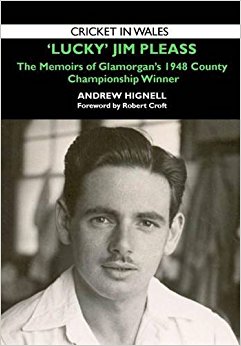Lucky Jim Pleass
Martin Chandler |Published: 2014
Pages: 119
Author: Hignell, Andrew
Publisher: St David's Press
Rating: 3.5 stars

For once I will get the grumbles out of the way first. The lesser by a distance is the lack of an index, something that I think is always a shame but, in a fairly brief book such as this which is split into a number of short chapters, it is certainly no more than a minor irritant. The absence of any statistics, however, is much more of a disappointment, particularly when the relevant numbers aren’t contained in the text.
Although Lucky Jim Pleass is a cricket book by any definition of that expression it is certainly an unusual one. It is essentially an autobiography, with lengthy passages of Pleass’ own words being interspersed with Hignell’s commentary.
Pleass made his bow as an amateur in 1947, and was a county professional for the next nine summers. He was a specialist batsman who, in an age when being such was unusual, was also a fine fielder. However he was not a great batsman, nor even a very good one. He was never completely sure of his place in the Glamorgan side and indeed only 37 of the book’s 119 pages are about his playing career, which is the main reason it would be so helpful to be able to trace his career through a brief statistical appendix. As it is Hignell’s reader will finish the book without knowing how many runs Pleass scored, his average, his best season, nor even, for sure, how many First Class centuries he recorded (the implication is it was just one, which I can confirm is the total).
Despite its relative brevity the treatment of Pleass’ career in the game is exemplary. There is the story of an unexpected call up to make that debut in 1947 and the story of his first season as a professional when, to the surprise of all except their captain Wilf Wooller (and if truth be told I expect even him), Glamorgan won the Championship. A few matches in that memorable summer get a mention. Other than that all you get is the tale of Pleass’ role in a famous victory over the touring South Africans in 1951; the wistful tale of how he almost made his first century against Northants; and how he then finally did get to three figures. It may only have been the once but it was a special one, bringing his county their first ever Championship victory in Yorkshire.
Outside the game Pleass’ life was not spectacular, but interesting nonetheless. His sporting career was one of many shortened by the Second World War. He served in the Royal Corps of Signals, and was there on D-Day. He wasn’t one of the invaders but was in the thick of the action and amongst other tales is the sobering one of just how close he came to death at the hands of a stray mine. After that there was a period in the Far East after the Japanese surrender.
Some time is spent on a Welsh childhood in the depression years, albeit the Pleass family was better placed than many. After cricket, Pleass went into insurance and started his own brokerage firm. That had its ups and downs but eventually flourished sufficiently to afford him an early retirement and the ability to indulge his passions for travel and golf, and take an administrative role with his old county. The insights into running a county club are fascinating, particularly on the question of the selection of overseas players, something Glamorgan didn’t always get right.
Lucky Jim Pleass is published by a specialist Welsh history publisher, which might be why the book has hidden its cricketing light under the proverbial bushel. It is well worth seeking out, however.






Leave a comment